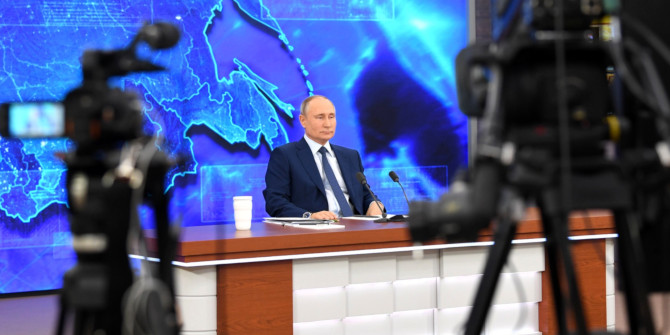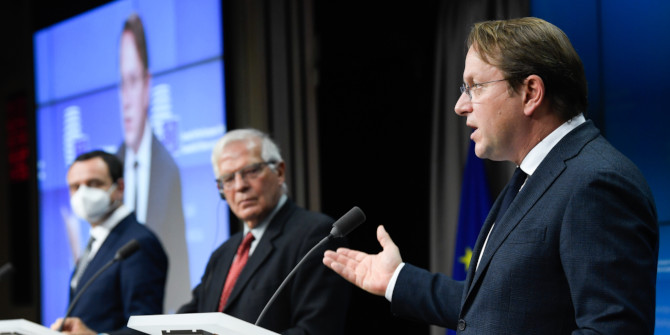The next meeting of the European Political Community will be hosted by the UK in July. James Dennison writes that coming shortly after the 2024 European Parliament elections and the UK’s general election, the meeting will offer an ideal opportunity for Europe’s new leaders to confront the continent’s many challenges.
On 18 July, the nascent European Political Community (EPC) will hold its fourth summit since its founding less than two years ago. The United Kingdom will host the occasion, two weeks after its 4 July general election – expected to usher in a new government – and just over a month after the 2024 European Parliament elections and the formation of a new European Commission.
The timing of the meeting of 47 European countries is thus a particularly auspicious opportunity for Europe’s new leaders to confront the continent’s many challenges. Whereas detractors have seen the EPC as a fig leaf to EU candidate countries, I argue that the emergence of the EPC potentially holds profound significance for European politics and integration, reflecting stubborn truths more apparent following Russia’s invasion of Ukraine.
The origins of the EPC
Plainly, the 2022 creation of the EPC represented a reaction to Russia’s invasion of Ukraine. Its timing and objectives – bringing together European states committed to “European values” regardless of EU membership for geopolitical cooperation – all reflect the invasion, as do its security-related, infrastructure and project-based policy aims, including on energy, cybersecurity, pipelines, undersea cables and satellites, and more tangentially climate change, migration and economics.
Its high politics and state sovereignty focus and purely European membership similarly reflect the violation of Ukrainian sovereignty and differentiate it from the Council of Europe, EU, NATO and OSCE. It quickly led to opt-ins to EU programmes by the UK and projects in Ukraine, while governments of both EU and non-EU members, as well as the EEA, have publicly expressed support for the fledgling organisation. Indeed, The EPC’s pre-eminence in an early 2023 UK-French Joint Declaration is telling.
However, the EPC’s characteristics reflect at least three deeper realities and imperatives about European politics and integration that were highlighted by but predate the war. These are, primarily, the superficiality of purely institutional notions of Europeanism, but also the stark limits of the EU institutions’ powers relative to states of Europe, and, not least given the 500,000 deaths to date in Ukraine, the persistent moral imperative of state sovereignty as the fundamental organising principle of European politics.
New possibilities
The logical ramifications of these realisations matter. First, they act as a corollary – if not partial corrective – to the overwhelming reputational victory of the EU institutions over their – prior to 2016, growing – Eurosceptic detractors, encapsulated by the UK and its Conservative government. Particularly during the Brexit negotiations, certain corners of Europe were able to simultaneously salute the European flag when it came to Brexit yet stay firm to self-serving national narratives used to justify defence free-riding, tax haven statuses and Putin apologism – all plainly anti-European, arguably culpable for the war but well within the bounds of EU rules. Some pro-Europeans celebrated the EU’s “united and effective” response to Brexit.
Yet, whereas the EU’s rational strategic move during the Brexit negotiations was passivity – sitting back while the UK government tied itself in knots and the clock ran down – the invasion of Ukraine called for an entirely distinct and more demanding response. Moreover, backing for Ukraine – a non-EU member state supported in European terms by both EU and non-EU member states – reminded us that Europeanism is not owned by certain institutions nor is it evidenced solely by adherence to and instrumentalisation of those institutions.
The invasion of Ukraine, about which Britain had been amongst the earliest and most unwaveringly “pro-European” states, partially reversed some previous roles. Just like London before, some of the EU’s keenest flag-wavers were now humbled by the reality of the world beyond their usual corridors and forced to show their inadequate, if not duplicitous, hand. It is no coincidence that France, as a geopolitical player aware of the need for nimble responsiveness at the highest level, not fitting the above bill, and not compromised like post-Brexit Britain, proposed the EPC.
By contrast, those most wedded to and benefitting from a purely EU-institutional view of Europeanism (as well as Russia) were most likely to dismiss the EPC. Yet the EPC, by being high-level, flexible, and, in membership and policy area terms, unique, reopens new possibilities of European integration, avoiding negotiated communiqués, easing candid conversations and quick agenda-setting. Whereas the EU had seemingly finally combined the various post-war Europeanist bodies, the new EPC represents a new institutional attempt at Europeanism in response to the inadequacies of the status quo.
Semper fidelis: the UK and the EPC
Prospectively and strategically for the new UK government, there is no upper limit to what it should seek for the development of the EPC. The latter’s objectives for the continent fully match the UK’s own, its set-up aligns with Britain’s traditional concerns over and visions for European politics, and its novelty insulates the government from reopening risky Brexit electoral divisions.
It therefore makes an ideal centrepiece to the – presumably – Labour government’s European policy, at least initially. Yet, an intergovernmental body does not have to be modest in aim. Margaret Thatcher’s dizzying “Europe, the future” 1984 document envisaged a radically empowered European Council as the driver of a Europeanisation focused on many of the same geopolitical objectives as the EPC forty years later. This vision fell by the wayside as the rest of the EU coalesced around inward-looking regulatory, institutional and monetary integration – difficult for the UK and quashing its popular “Europhoria” during the late 1980s and early 1990s.
Practically, the new UK government should pull out all the stops in institutionalising, facilitating and enthusing support for the EPC, including an offer to host and fund a permanent London-based Secretariat. Doing so would, for the first time, put “Europe” in the centre of Westminster life while EPC forums continue to alternate between EU member states and non-member states biannually.
EU institutions and governments suspicious of such moves should consider the resources, good faith and potential future integration that such a move could enable, while best helping the EPC participant states to meet their urgent, increasingly expansive, common – and crucially, within the EU, not integrated – geopolitical challenges.
Note: This article gives the views of the author, not the position of EUROPP – European Politics and Policy or the London School of Economics. Featured image credit: European Union





